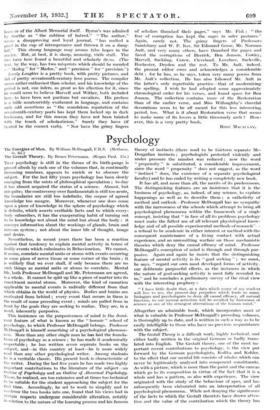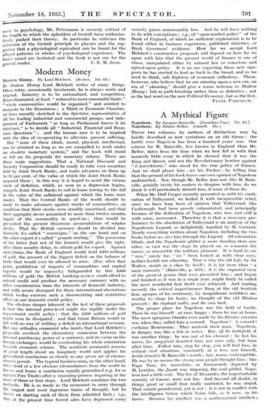Psychology
The Gestalt Theory. By Bruno Petermann. (Kegan Paul. 15s.) THAT psychology is still in the throes of its birth-pangs is proved afresh by each one of the volumes that, in continually increasing numbers, appears to enrich or to obscure the subject. For the last fifty years psychology has been slowly emerging from the mists of philosophical speculation ; to-day it has almost acquired the status of a science. Almost, but not quite; the controversy over fundamentals is still too acute, the boundaries- are still too indefinite, the corpus of agreed knowledge too meagre. Moreover, whenever one does come upon a piece of knowledge in the sphere of psychology which is definite, which asserts verifiable facts and to which every- body subscribes, it has the exasperating habit of turning out to be knowledge not about the mind but about the body : it conveys information about the workings of glands, brain and nervous system ; not about the inner life of thought, image and desire.
Nevertheless, in recent years there has been a reaction against that tendency to explain mental activity in terms of bodily events which culminates in Behaviourism. We cannot, it seems, correlate mental units or atoms with events occurring in some piece of nerve tissue or some corner of the brain ; it is unlikely that we ever shall, if only because there are no such things as mental units or atoms to correlate. Mental life, both Professor McDougall and Mr.-Petermann are agreed, is a whole. It cannot be split up like a piece of matter into its constituent mental atoms. Moreover, the kind of causation applicable to mental events is radically different from that which obtains in the world of physics. Bodies and brains are motivated from behind ; every event that occurs in them is the result of some preceding event ; minds are pulled from in front by the goals they are seeking to realize. They are, in a word, inherently purposive.
This insistence on the purposiveness of mind is the domi- nant feature of what is known as the " hormic " school of Psychology, to which Professor McDougall belongs. Professor McDougall is himself something of a psychological phenome- non. More than any other single man he has laid the founda- tions of psychology as a science ; he has made it academically respectable ; he has written seven separate books on the subject, and—in this country at least—he is more widely read than any other psychological writer. Among students he is a veritable classic. His present book is characteristic of the writer. During the last five years he has made two highly important contributions to the literature of the subject—an Outline of Psychology and an Outline of Abnormal Psychology. These, he realized, are too extensive and at times too technical to be suitable for the student approaching the subject for the first time. Accordingly, he set to work to simplify and to condense the two books into one, found that his views had in vertain respects undergone considerable alteration, notably in relation to the nature of the learning process and his famous theory of instincts (there used to be thirteen separate Mc- Dougalian instincts ; psychologists- protested violently and under pressure the number was reduced ; now the word
"propensity" is substituted, a considerable improvement. since the word " propensity " does not suggest, as the word " instinct " does, the existence of a separate psychological
faculty) and he has ended by writing a completely new book. It has all, and more than all, the merits of its predecessors. The distinguishing features are an insistence that it is the business of psychology, as, indeed, of any science, to explain happenings as well as to describe them ; a catholicity of method and outlook—Professor McDougall has no sympathy with the narrowness of the schools which attempt to bring all psychological phenomena within the framework of a single concept, insisting that "in face of all its problems psychology must make the fullest use of all relevant physiological know- ledge and of all possible experimental methods of research"— a refusal to be academic in either interest or method with the consequent maintenance Of a living contact with actual experience, and an unremitting warfare on those mechanistic theories which deny the causal efficacy of mind. Professor McDougall's conception of mind is through and through pur- posive. Again and again he insists that the distinguishing feature of mental activity is its "goal seeking " ; we must, he says, "regard our own most developed forms of activity, our deliberate purposeful efforts, as the instances in which the nature of goal-seeking activity is most fully revealed to us," and he concludes a preliminary survey of the rival view with the interesting prophecy : "I have little doubt that, at a date which ninny of my readers will live to see, the present-day prejudice which leads so many biologists and psychologists to deny all causal efficacy, all natural function, to our mental activities will be recalled by historians of science as one of the strangest aberrations of the human mind."
Altogether an admirable book, which incorporates most of what is valuable in Professor McDougall's preceding volumes, is thoroughly up to date, and is written in such a way as to be easily intelligible to those who have no previous acquaintance with the subject.
The Gestalt Theory is a difficult work, highly technical, and either badly written in the original German or badly trans- lated into English. The Gestalt theory, one of the most im- portant recent contributions to psychology, is the view put forward by the German psychologists, Koffka and Kohler, to the effect that our mental life consists of wholes which can never be legitimately analysed into component constituents. As with a picture, which is more than the paint and the canvas which go to its composition in virtue of the fact that it is a whole and has a pattern, so also with experience. The view originated with the study of the behaviour of apes, and has subsequently been elaborated into an interpretation of all psychological phenomena. While not denying the significance of the facts to which the Gestalt theorists have drawn atten- tion and the value of the contribution which the theory has made to psychology. Mr, Petermann is severely critical of the length to which the upholders of Gestalt have enthusias- tically pushed their theory. In particular he criticizes the extension of the Gestalt principle to physics and the sug- gestion that a physiological equivalent can be found for the alleged patterns or wholes of psychological experience. The Issues raised are technical and the book is not one for the

































































 Previous page
Previous page